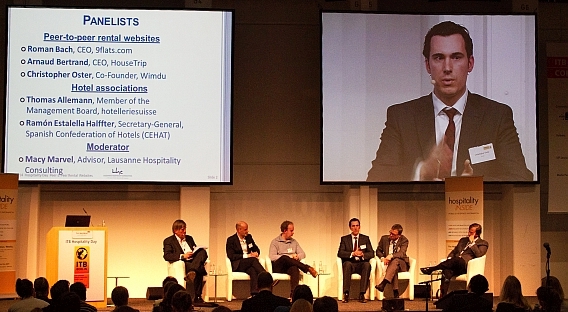ITB Hospitality Day: Private room sellers and hotels exchange arguments
 |
|
| P2P is a new competition for hoteliers. At the ITB Hospitality Day, the parties explained their positions but no agreement was found. / photos: ostwestfoto |
Berlin (March 21, 2014). Growth of the so-called "Peer-to-Peer" (P2P) online platforms has been incredibly fast. Three years ago, hyped by lifestyle magazines as casual couch surfing, private accommodation on travels has become a mega million business particularly in major cities thanks to portals like Airbnb, Wimdu, or 9flats. This occurred at the expense of the hotel industry under unequal requirements, complained discussion participants of international hotel associations at a panel in the course of the ITB "Hospitality Day". In contrast, P2P providers were convinced of attracting new types of guests for the tourist industry. There was little room for differing nuances within these two poles on the podium.
The hotel industry was represented by Thomas Allemann, Member of the Board of the Swiss hotelleriesuisse hotel association, and Ramón Estalella Halffter, Secretary-eneral of the Spanish association of hotels and accommodation businesses. (According to Maria Puetz-Willems, who organized the conference, it was impossible to find a single hotelier or an individual hotel group as a panel guest.) The agents of private accommodation were represented by Christopher Oster, co-founder of Wimdu, Roman Bach, Managing Director of 9flats, and Arnaud Bertrand, CEO of HouseTrip.
Switzerland counted 35 millions room nights per year half of which were attributed to holiday homes. However, statistics on holiday homes were abolished five years ago, said Allemann. "So far, we've had no problems with privately offered holiday homes. The supply is well-integrated in the marketing of the separate regions, and providers also paid the corresponding marketing fees and taxes." His objection: "Now this moves on to the cities, which is regulated but not checked."
Quick success regarding scales and high revenues
In Zurich, already 1.5 percent of room nights refer to the P2P segment, according to Allemann. Particularly Airbnb was aggressively pushing on the market offering more than 400 apartments in Zurich at the moment. "Such offers affect all categories," foresees Allemann. His Spanish colleague Ramón Halffter confirmed that the phenomenon was not private suppliers but the platforms. "They started with free-of-charge sharing; now there are fees, commissions, and revenues. It's simply become big business." At the start of the discussion, 9flats gloated over the fact that it offered more beds than Hilton and generated profits only three years after its foundation.
 |
|
| Talking to the audience: the hoteliers Ramón Estalella Halffter from Spain, Thomas Allemann from Switzerland (from right), left Christopher Oster of Wimdu. |
When it comes to delivering concrete revenue figures, the suppliers are rather reluctant. More than ten million room nights have been booked via Airbnb, despite the fact that it considers itself a social network and thus an element of the share economy at its core. HouseTrip refers to 235,274 accommodations offered at 350 destinations all across the world. Most recently, the portal's investment sum was 2.4 million pounds Sterling (approx. 2.9 million euros).
The panel members revealed their commission rates. Wimdu and HouseTrip both spoke of 15 percent commission in general, whereas 9flats charged between 6 and 15 percent depending on quality and booking volume.
Families with kids as newly addressed target group
The portals' operators do not consider themselves hotel competitors. "We also bring families into the cities. And our other customers are young people who like to enter urban life more deeply," says Oster. Private accommodations were clearly more spread across the entire city compared to hotels that are mostly located around the city centre. But above all, the Wimdu representative referred to a self-conducted survey according to which 40 percent stated they would not have chosen the destination in question if it were not for Wimdu's offer. Allemann of hotelleriesuisse seemed to have been just waiting for this figure: "That means 60 percent had been hotel guests!"
Oster added: "The revenues we generate directly go into local shops and restaurants, not only to the city centres. In this way, we strengthen local infrastructure." 9flats is also convinced that portals would increase tourism revenues generated at a destination: "There are market surveys showing that those spending less on their accommodation have a larger budget for other activities on site," said Bach. He also highlighted that parents with small kids were new city tourists, but he also stated that portals addressed a highly diverse clientele. There was room even in the luxury segment.
Arnaud Bertrand mentioned three trends for a luxury provider such as HouseTrip, which he helped to found: people want to live cheaply, authentically and freely. 94 percent of HouseTrip's portfolio consists of apartments, in Paris, the platform's average rate for a two-room flat is 120 euros per day. Bertrand mentioned himself as a prime example of a HouseTrip guest. "I live in a private flat here as well and I can have breakfast in my pajamas. All our users want to stay themselves when it comes to travelling." Six out of ten HouseTrip bookings included children.
All hotel categories will suffer
Halffter tried to describe the problem regarding Spanish core destinations. Accordingly, Madrid recorded a 15-percent drop in hotel room nights, despite airlines recording increasing number of guests. In cities like Madrid and Barcelona, but particularly on the Canary Islands, the P2P model had resulted in a 1.5-percent drop in hotel room nights with declining average rates at the same time and a rising supply of offers in the private accommodation segment by 600 percent!
 |
|
| Moderator Macy Marvel, Roman Bach of 9flats and Arnaud Bertrand of Housetrip (from left). |
Halffter strongly criticized that P2P providers were drawing revenues out of the country while revenues of Spanish apartment owners remained inside. "Spanish hoteliers know that they cannot turn around this trend," says Halffter, but he demands: "There should be equal treatment. With 200,000 affected, it is the biggest field of illegal employment, which is why regulation must not only refer to providers themselves, but also to the platforms."
Another argument of the hoteliers, which should mainly motivate the cities to take measures against the various kinds of private accommodation is the drastic housing shortage in many cities. They believe that the total supply of accommodation offered by P2P platforms in Berlin (currently more than 5,000 apartments) supports this negative development. The P2P representatives strongly objected to this, accusing politics of failure and saying that hoteliers did not know the ropes of yield management.
Moral versus revenues
Arnaud Bertrand of HouseTrip mentioned the idea of the share economy in favour of the P2P providers: you buy something for primary use adding a second and third use. However, the discussion unearthed the question of how many hosts had a commercial background and how many would rather base their offers on the principle of sharing, social contact and mutual use.
Concerning Wimdu, Oster said that 70 percent of the accommodations offered were primary and secondary residences and that only the rest was backed by professionals. "Both groups are important to us." Bach said that 80 percent of 9flats' revenues were generated through professional owners, while Bertrand did not reveal any concrete figures. Often, accommodation management companies acted on behalf of the owners. Whereas the P2P providers emphasize that all those commercially active were subject to the corresponding tax provisions applying to entrepreneurs. Short-term renting could not be compared to the hotel business. Bach compared the situation with eBay: "If I earn my living with it, I pay as a businessman. If I offer something on an on and off basis, it is a hobby."
Taxation and responsibilities of P2P remain questionable
The final phase of the discussion on "ITB Hospitality Day" was dominated by the questions of equal treatment of hotels and private providers in legal terms. In many cities and regions, the hotel industry has managed to slow down P2P providers. For example, tenants are not allowed to sublet their dwellings on a temporary basis in Switzerland. Or in San Francisco, where apartments cannot be rented for less than 30 days.
Halffter mentioned several aspects of differing treatment: hoteliers have to deal with environmental protection, labour law, municipal tourism fees, consumer protection, various taxes (e.g. value-added tax, taxes for cities, environmental protection, safety etc.) ... "But there are also the interests of neighbours, for example. After all, we would like to act on eye-level." He demanded that the hotel industry should be less regulated in general, as the professional hosts were collapsing under the flood of regulations.
If there was a consensus at all, than it was the fact that P2P platforms are not against taxation in general, however, they say that a temporarily rented student apartment could not be treated in the same way as a professional apartment lessor or even a hotel with 60 rooms.
Roman Bach of 9flats added: "We definitely inform our partners that they have to obey local legislation. In addition, we collect tax numbers step by step so that there won't be any problems with the financial authorities in the future." It seems like the upcoming P2P providers, despite being rather self-confident, see themselves more and more in the defensive.
In order to secure their interests, several platforms recently formed the "Short Term Rental Advocacy Center" (STRAC) (see link). Particularly in Berlin, the dispute about private room providers was especially fierce, and the new law would strongly restrict possibilities for them. "Here, nobody tried to start a dialogue. The acting parties were not included," complains Wimdu's Oster.
In the discussion with the audience, somebody spoke for the lessors. In June 2013, Claudia Duenckmann founded an association representing the providers' interests in Berlin. She represents 47 owners with 550 apartments. "These are responsible businesses, professionals with a codex and quality standards. They all pay taxes as well as the city tax for their guests," says Duenckmann, who regrets that her association might have become established too late. Now, the law will show the negative effects in two years’ time. However, her clients were talking about a sharing economy. They are investors who considered urban holiday apartments a business idea: "Many of them went into debt and their existence is at stake," says Duenckmann describing the status quo.
P2P hits the headlines
Last Tuesday, media told that Airbnb - the P2P market leader - plans to offer hotel services in the future as well. According to the "fastcompany.com" online magazine, the host will soon introduce services like cleaning, airport transport and more. On request of hospitalityInside.com, Airbnb slowed down these news saying that there are no news right now.
Yesterday, US media reported that Airbnb Inc. is in advanced talks to raise funds that would value the online home-rental marketplace at more than $10 billion, according to several people familiar with the process. Private-equity firm TPG is likely to lead the round. Then, Airbnb would be valued more highly than some large hotel operators with which it competes, e.g. Wyndham Worldwide Corp. has a market value of $9.4 billion. Hyatt Hotels Corp. is valued at $8.4 billion.
The German "Focus" magazine publised another story this week saying the tenant of an Airbnb apartment in New York used it to host a swinger party. The police put an end to the party and the owner collected his furniture on the street afterwards. On Tumblr, the tenant spoke of 87,000 euros of damage and yet, Airbnb had accepted the customer as a "certified" member. / Fred Fettner
Continuative Links:
To print this article you have to be registered and logged in for newsletter, visitor or subscription.





